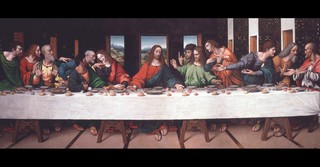Do You Have to Be Saved to Take Communion?
Share

Members of the Christian church — those who have surrendered their lives to Jesus Christ — practice many traditions. Some customs include but are not limited to worshipping on Sundays (which is a command, as seen in Hebrews 10:24-25) and celebrating Christmas and Resurrection Sunday.
In addition to traditions, Christians follow specific commands given by the Lord Jesus Christ. Taking part in Communion is one such command.
Photo credit: ©SparrowStock
What Is Communion?

Communion is the name given to the celebration of the Lord’s Supper, which Jesus instituted in Matthew 26:17–29 (Mark and Luke also record this in Mark 14:12–25, and Luke 22:7–38). In these passages, Jesus and His disciples gathered to celebrate the Passover. Jesus’ focus is on the New Covenant which He guaranteed by presenting Himself on the cross — He sacrificed His body and His blood for those who would believe in Him.
Matthew 26:26-29 says, “Now as they were eating, Jesus took bread, and after blessing it broke it and gave it to the disciples, and said, ‘Take, eat; this is My body.’ And He took a cup, and when He had given thanks He gave it to them, saying, ‘Drink of it, all of you, for this is My blood of the covenant, which is poured out for many for the forgiveness of sins. I tell you I will not drink again of this fruit of the vine until that day when I drink it new with you in My Father's kingdom.’”
In 1 Corinthians 11:23–25, the Apostle Paul reiterated the command to the struggling church in Corinth. He reminded them what Jesus did and instructed them to observe communion in remembrance of Him. He highlighted that Jesus told His disciples the cup is the New Covenant in His blood. Paul finished by telling them what Jesus said, “‘Do this, as often as you drink it, in remembrance of Me.’ For as often as you eat this bread and drink the cup, you proclaim the Lord’s death until He comes.”
When we celebrate communion, we remember that by His death, we live.
Photo credit: ©Getty Images/Mizina
Where Did This Practice Come From?

On the evening before His death, Jesus Christ inaugurated communion when He gathered with His disciples in the Upper Room during the Jewish feast of the Passover. The Jews celebrated Passover to commemorate their miraculous deliverance from the Egyptian oppressors (Exodus 12).
R.C. Sproul said, “Early Christians partook of the sacrament at the end of their agape feasts, meals that celebrated the love of God and the love they had for one another. Many refer to the Lord’s Supper as ‘Holy Communion’ because it pictures the union believers have with the Savior and with one another.”
In the Passover, the blood of a lamb was spread on the Jewish peoples’ doorframes so the Angel of Death would pass by their homes and bring the wrath of God on the Egyptians. Jesus’ blood has taken the place of the Old Covenant. His is the new and everlasting covenant.
Acts 2:42 tells us the early Christians were devoted to “the apostles’ teaching and the fellowship, to the breaking of bread and the prayers.” The breaking of bread here refers to the Lord’s Supper.
In Acts 2:46 we are told, “And day by day, attending the temple together and breaking bread in their homes, they received their food with glad and generous hearts…”
Why Did Jesus Institute Communion?
Because Jesus fulfilled the Old Covenant, the spilling of His blood (in death) brings salvation from sin and death to those who surrender to Him as Lord and Savior. His blood is the New Covenant brought by the spotless Lamb of God (John 1:29, 36).
His Supper is a sign of the New Covenant He inaugurated.
Why Do We Take Communion Today?
Taking part in communion means we remember (with reverence and awe) what Jesus did for us on the cross. It is a solemn and reflective time for each individual, for Jesus instituted it at a solemn time, during Passover and the night before His death. We in effect have supper with Jesus, and until the marriage supper of the Lamb (Revelation 19:9), communion is our remembrance of what He did on the cross. And what He did secures the salvation of everyone who surrenders to Him.
Communion strengthens our faith as we remember what Christ did for us. We have a future. We have a hope because of what Jesus did for even us. Erik Raymond says we are saved by God from God and for God.
When a church celebrates communion does not matter. What matters is that the church observes the Lord’s Supper regularly. Most churches observe this ordinance once a month — usually on the first Sunday. Others take part weekly or even quarterly.
Photo credit: Leonardo Da Vinci/Public Domain Image
Do You Have to Be Saved to Take Communion?

Look at what the Apostle Paul says in 1 Corinthians 11:27-34. The Corinthian church experienced division in a number of ways, including those of means who exalted themselves over others of a lower estate. They were not properly partaking of the Lord’s Supper. Paul addressed their division by telling them their factionalism was allowing the abuse of the meaning of the church’s main ordinance — the Lord’s Supper.
Paul stated that whoever “eats the bread or drinks the cup of the Lord in an unworthy manner will be guilty concerning the body and blood of the Lord” (verse 27). Paul was not making an idle threat when he said, “…anyone who eats and drinks without discerning the body eats and drinks judgment on himself.” The Corinthian church, because of the careless way it approached the Lord’s Supper, suffered sickness and death as judgment (see verse 30).
Paul tells the church not to come to the Lord’s Table hungry for physical food. Instead, they should eat at home before coming together as a church (verse 32). Then their hunger will be a proper one — for the Lord.
Therefore, you do have to be saved to take communion as it’s directed by the Lord Jesus. Look at it this way. If you, as an unbeliever, grab the elements of communion — the bread and wine (or juice, as many churches use) — you are taking what belongs only to believers — those who have surrendered to Jesus Christ. I don’t mean to sound crass, but if you’re not saved, and you drink the wine (or juice) and eat the bread (or wafer), all you are doing is having an appetizer. There is no solemnity or reverence in what you do.
We who are saved by His blood must do a self-examination; we are to ask ourselves if we are walking with Christ in a worthy manner. We must reflect on Jesus and ask His forgiveness for our sins and then thank Him for saving us from God’s wrath and for His glory.
Photo credit: Pexels/Nathan Cowley
How Can I Explain This to my Non-Christian/Investigating Friend

The Gospel is always the best starting point for any conversation regarding what Christians do both in the worship of and service to the Lord Jesus. The Bible tells us “the natural person does not accept the things of the Spirit of God, for they are folly to him, and he is not able to understand them because they are spiritually discerned” (1 Corinthians 2:14). That truth can make communicating our beliefs to an unbeliever a daunting proposition, but we are called to proclaim the Gospel, and Jesus is with us as we do (Matthew 28:18-20).
Once we explain the eternal importance of our beliefs, we can then tell a non-Christian why we follow Jesus’ command to celebrate communion. They may still not understand, but our obedience to Him will testify to our genuine faith in Him.
In conclusion, coming together for the Lord’s Supper is a picture of the glorious supper to come — the Marriage Supper of the Lamb (Revelation 19:9). One day every believer of all time will celebrate together. When you celebrate communion with your church, pray, reflect, remember, and rejoice in Jesus.
Photo credit: ©Getty Images/Thomas Barwick
